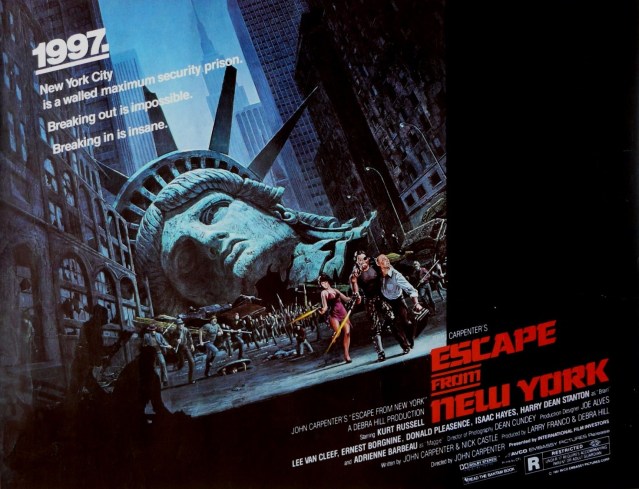What’s worse than trying to escape from a futuristic Manhattan island as maximum security prison? Getting injected with a time bomb and forced to land on the roof of one of the World Trade Centers to help some swine of a president escape.
What makes it better?
1: A spartan but amazing soundtrack by John Carpenter.
1: A spartan but amazing soundtrack by John Carpenter.
Listen to The Duke Arrives and the Main Theme.
2: Snake Plissken is one bad, bad dude.
3: Adrienne Barbeau. If this is prison, throw away the key.
2: Snake Plissken is one bad, bad dude.
3: Adrienne Barbeau. If this is prison, throw away the key.
4: John Carpenter's Escape from New York has a straightforward, made for video game plot, complete with a boss fight right at the end with Isaac Hayes, uh, I mean The Duke.
But I have more for you than random fanboy reflections. John Carpenter’s Science Fiction classic Escape from New York reflects a changing American landscape. One in which more people than ever were jailed, more people were suspicious of the government and government leaders, and unlikely individuals were viewed as heroes.
Over-Policing and the Inner City
As a result of tougher sentencing related to heroin and marijuana possession in the Nixon era, by the late ‘80s, American cities reflected a prison state. Greater numbers of Americans, especially black Americans, were forced into the prison system. Black communities were splintered as a result of over-policing. Clearly, Carpenter’s New York City as abandoned slum prison is fictitious. No American City was ever walled off as a no man’s land to fill with convicts (although parts of Detroit came rather close). But Carpenter was extrapolating a decade into the future, considering how a bad situation would flower into a worse one after a generation dealt with an increasingly disrupted community in the face of unprecedented sentencing for small-crime offenders.
John Carpenter's Escape from New York gets going when a revolutionary hijacks the president’s plane. Such open dissidence to the president reflects distrust of the executive branch in the Reagan era. To many, Reagan always seemed disingenuous. It was tough to look past his former career as an actor. But Reagan would probably have drawn fewer critics if it wasn’t for Nixon’s, then, relatively recent resignation. Nixon, though he said otherwise, was a crook, and his betrayal of the American public shook trust in the government and its elected leaders. That the president in Escape from New York crash lands in a prison city is itself significant. The message is that perhaps the president belongs in prison.
Crooked Politicians
John Carpenter's Escape from New York gets going when a revolutionary hijacks the president’s plane. Such open dissidence to the president reflects distrust of the executive branch in the Reagan era. To many, Reagan always seemed disingenuous. It was tough to look past his former career as an actor. But Reagan would probably have drawn fewer critics if it wasn’t for Nixon’s, then, relatively recent resignation. Nixon, though he said otherwise, was a crook, and his betrayal of the American public shook trust in the government and its elected leaders. That the president in Escape from New York crash lands in a prison city is itself significant. The message is that perhaps the president belongs in prison.
Criminality and Leadership
Escape from New York reflects a vacuum in respect for leadership by having the president disappear into the prison city. In place of the chief executive’s leadership, Carpenter gives us Snake Plissken, a Special Forces World War III hero turned criminal. But Plissken’s criminality is forgivable, resulting from his loss of faith in the US government. Plissken knew that his duties in the military were criminal. Turning to crime after the military was less a departure and moral failure and more a direction he’d already been pushed toward.
Criminality and Integrity
In Escape, Snake Plissken has more integrity than the President. Heck, the Duke has more integrity than the president. The move to question the integrity of leadership and instead laud criminals as society’s heroes has a demonstrable history in America. Jesse James is a strong analog to Plissken. James was viewed as a hero by many Southerners for his ex-Confederate status. His Midwestern raids on banks, stagecoaches, and trains symbolized extra-legal justice for Southerners that still felt they had been wronged by Northern aggression.
"Call me Snake"
Plissken doesn’t say much. His catchphrase is “Call me Snake,” a request that highlights his unpretentiousness and demonstrates his well-placed duplicity. When he switches out the president’s tape on nuclear fission crucial to world peace for an American Bandstand tape, a move you might expect of a guy named Snake, he doesn’t hold up his deal with Police Commissioner Bob Hauk in favor of ruining the president. But he made all that clear from the start, telling Hauk “I don't give a fuck about your War or your President."
In the early ‘80s, not even a decade after the end of the Vietnam War, Snake Plissken’s nonconformist attitude resonated powerfully with many jaded Americans. And the message of the movie still holds up. We can escape from our own New Yorks by demanding that our elected officials pursue integrity as they execute the powers of their offices.
Watch Escape from New York at Amazon
Ready for More Rapid Transmissions?
I am Legend
Myst
The Island of Doctor Moreau
In the early ‘80s, not even a decade after the end of the Vietnam War, Snake Plissken’s nonconformist attitude resonated powerfully with many jaded Americans. And the message of the movie still holds up. We can escape from our own New Yorks by demanding that our elected officials pursue integrity as they execute the powers of their offices.
Watch Escape from New York at Amazon
Ready for More Rapid Transmissions?
I am Legend
Myst
The Island of Doctor Moreau
